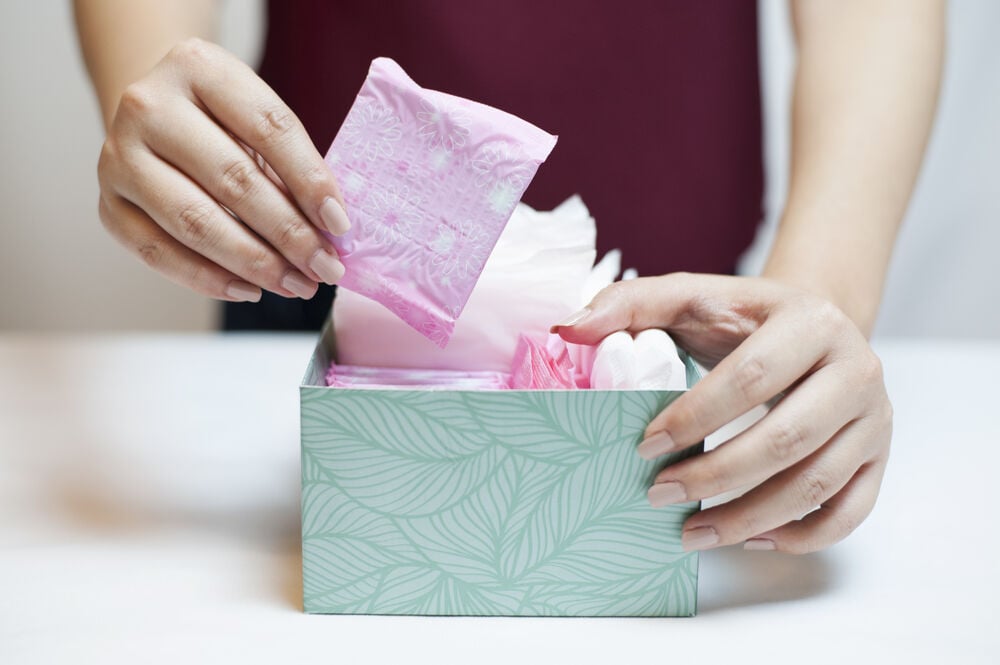The first time you have sex after giving birth, you might experience some bleeding. Chances are, this is just part of your postpartum recovery. However, in some cases, bleeding may indicate more-serious health issues. Check out these four common medical reasons why you might be bleeding after postpartum intercourse.
-
Tracking cycle
-
Getting pregnant
-
Pregnancy
-
Help Center
-
Flo for Partners
-
Anonymous Mode
-
Flo app reviews
-
Flo Premium New
-
Secret Chats New
-
Symptom Checker New
-
Your cycle
-
Health 360°
-
Getting pregnant
-
Pregnancy
-
Being a mom
-
LGBTQ+
-
Quizzes
-
Ovulation calculator
-
hCG calculator
-
Pregnancy test calculator
-
Menstrual cycle calculator
-
Period calculator
-
Implantation calculator
-
Pregnancy weeks to months calculator
-
Pregnancy due date calculator
-
IVF and FET due date calculator
-
Due date calculator by ultrasound
-
Medical Affairs
-
Science & Research
-
Pass It On Project New
-
Privacy Portal
-
Press Center
-
Flo Accuracy
-
Careers
-
Contact Us
4 Medical Reasons Why You Might Be Bleeding After Postpartum Intercourse


Every piece of content at Flo Health adheres to the highest editorial standards for language, style, and medical accuracy. To learn what we do to deliver the best health and lifestyle insights to you, check out our content review principles.
1. You had sex before lochia stopped
Everyone bleeds after giving birth. It’s your body’s way of getting rid of mucous, blood, and uterine tissue and recovering from the normal trauma of birth. Lochia usually lasts for four to six weeks after delivery. For the first few days postpartum, you will experience a heavy flow with bright red blood and blood clots.
Take a quiz
Find out what you can do with our Health Assistant
After that, your lochia flow slows and should become lighter, with blood that is pinkish-brown. Your cervix has not closed until lochia has stopped. Continued lochia flow is also a sign that your uterus has not completely healed yet. This makes you more vulnerable to vaginal and uterine infections.
Sometimes bleeding stops for a few days and then resumes. This is a normal part of the healing process, but it does mean that you still need more time to recover.
Health care providers advise waiting until lochia has completely stopped before resuming penetrative sex. Most medical experts agree that oral sex and masturbation are completely fine a few days after childbirth. When it comes to intercourse, it’s a good idea to wait until your six-week postpartum visit, when your health care provider will check to make sure you’re on the way to recovery.
2. Bad timing
Postpartum sex can be tricky. There are a lot of factors to consider, including physical recovery from childbirth, your emotional state, your sex drive, breast tenderness or soreness, pain, or simply feeling different. Intercourse after a C-section comes with its own challenges, and you may find that it’s taking longer than you expected to feel ready for sex again. There are many postpartum issues that can affect your ability or desire to have sex, and that’s okay.
Maintain open and honest communication with your partner, and let them know how you’re feeling before you start having sex again. If you aren’t ready, you may not be able to relax during intercourse.
If you do feel ready and bleeding has stopped, pause and check in with yourself and your body. Make sure to give your body the time it needs to recover, and don’t rush into penetrative sex too soon. If you’re not ready yet, you can try focusing on other ways to be intimate with your partner.
When you and your partner feel ready, your body has healed, and the desire is there, you may still bleed after your first few times having postpartum sex. A little bleeding and discomfort is totally normal. It means that there may be scar tissue in or around your vagina that will soften over time. It might be a good idea to take things slow in the beginning.
The uterus is another potential source of bleeding from postpartum sex. Orgasm causes the uterus to contract, which may trigger bleeding if it is not fully healed.
It’s quite common to see blood after postpartum intercourse. The bleeding will most likely stop shortly after. If the bleeding is heavy (you need to change a tampon or pad after less than two hours, or you pass blood clots the size of a quarter), consult with your health care provider.

3. You’re experiencing vaginal dryness
Lack of lubrication is a very common occurrence postpartum. Before and during pregnancy, you may not have experienced this at all because your body naturally produced all the lubrication you needed. Now, vaginal dryness may be affecting your sex life more than you realize.
Vaginal dryness is especially common if you are breastfeeding because your estrogen levels are lower than usual. Estrogen plays a major role in vaginal lubrication, and if you’re nursing, you might want to add extra lubrication during sex.
Water-based lubricant can save you from a lot of discomfort during postpartum sex. Feel free to use it liberally; it’s there to ensure that things go smoothly!
4. You have stitches
If you have stitches from tearing or an episiotomy, you may be more likely to bleed after your first few times having postpartum sex.
Episiotomy stitches start dissolving after 10–14 days. In most cases, they are healed by the one-month mark, but it’s best to consult your health care provider about your healing process before you start having sex again.

How to care for postpartum bleeding (and get back to the bedroom sooner!)
Your body has been through a lot, and you don’t want to delay the healing process any longer. These tips can help you recover as quickly as possible so that you can resume normal (sexual) activity as soon as possible!
- Don’t wipe. Keep toilet paper far away from your vagina, perineum, and anus for a week or two after giving birth. Instead, get a squirt bottle and fill it with room-temperature water. Use it to clean up after urinating. For a more thorough cleaning after pooping, hop in the shower for a quick wash. Make sure to be gentle.
- Take a stool softener. Your first poop after childbirth may feel uncomfortable. To make the process as easy and painless as possible, talk to your health care provider about taking a stool softener and eating a special diet to prevent constipation and straining.
Tips for great postpartum sex
You might experience mild pain the first few times you have postpartum sex. Luckily, there are ways to help your body recover so you can focus on enjoying sex. These tips will help keep you comfortable as you resume sexual activity postpartum.
- Follow your health care provider’s advice. Even if you have friends or family telling you about the great sex they had right after childbirth, everyone and every pregnancy is different. It isn’t worth risking injury or infection.
- Get some lube. The importance of vaginal lubrication during sex after childbirth cannot be stressed enough. Water-based lubrication is an important part of great postpartum sex.
- Take it slow. Things that you may have enjoyed before childbirth may no longer do it for you. In fact, they may be painful. It may take some time to find out what feels good in your body. If something hurts, experiment with different positions to avoid hitting tender spots. Don’t rush penetration, and be gentle in the beginning.
- Be honest. It’s important for your partner to know exactly what’s going on with you mentally and physically. Whether you’re feeling self-conscious, physically uncomfortable, or aroused, it’s helpful for your partner to understand what’s going on.
- Make sure you’re aroused before penetration. Certain hormones are released to trigger lubrication and relaxation of the vaginal muscles. This can make things a lot easier when you decide you’re ready for penetrative sex.
- Wear a bra. If you’re breastfeeding, you may find that your breasts are tender and leaky, especially during sex, when the same hormones are released as the ones during letdown. Wearing a supportive bra during sex can help with these issues.
- Do Kegel exercises. Kegel exercises are designed to strengthen your pelvic floor muscles so that you gain control over your bladder and anal sphincter.
- Don’t hesitate to say no. You can stop at any point along the way if you’re uncomfortable. Just keep an open line of communication with your partner and let them know if you’re not feeling ready. After all, avoiding intercourse does not have to mean avoiding all sexual activity.

Conclusion
It’s good to remember that there is no “normal” when it comes to pregnancy and childbirth. Each and every delivery is different and so are the healing processes that follow.
While you and your partner may be eager to resume intercourse after giving birth, it’s important to listen closely to your body and your health care provider.
You might see blood after having postpartum sex. A little bleeding is normal, but definitely consult your health care provider if it’s heavy (i.e., you need to change a tampon or pad after less than two hours, or you’ve noticed blood clots the size of a quarter).
Even if you had a difficult start, things will get better with time. Be patient with yourself. You did just make a person, after all.


Hey, I'm Anique
I started using Flo app to track my period and ovulation because we wanted to have a baby.


The Flo app helped me learn about my body and spot ovulation signs during our conception journey.


I vividly
remember the day
that we switched
Flo into
Pregnancy Mode — it was
such a special
moment.
Real stories, real results
Learn how the Flo app became an amazing cheerleader for us on our conception journey.
References
“Your Body Just after the Birth.” NHS Choices, NHS, 8 Mar. 2018,
www.nhs.uk/conditions/pregnancy-and-baby/you-after-birth/.
“Physical Changes after Child Birth.” Cleveland Clinic, 1 Jan. 2018,
my.clevelandclinic.org/health/articles/9682-pregnancy-physical-changes-after-delivery.
“Optimizing Postpartum Care.” ACOG, May 2018,
www.acog.org/clinical/clinical-guidance/committee-opinion/articles/2018/05/optimizing-postpartum-care.
Familydoctor.org Editorial Staff. “Recovering From Delivery - Postpartum Recovery.” Familydoctor.org, 26 Jan. 2017,
familydoctor.org/recovering-from-delivery/.
Signorello, Lisa B., et al. “Postpartum Sexual Functioning and Its Relationship to Perineal Trauma: A Retrospective Cohort Study of Primiparous Women.” American Journal of Obstetrics & Gynecology, 1 Apr. 2001,
www.ajog.org/article/S0002-9378(01)55770-1/fulltext.
Fletcher, Susan, et al. “Lochia Patterns Among Normal Women: A Systematic Review.” Mary Ann Liebert, Inc., Publishers, Journal of Women's Health, 4 Dec. 2012,
www.liebertpub.com/doi/abs/10.1089/jwh.2012.3668?rfr_dat=cr_pub%3Dpubmed&url_ver=Z39.88-
2003&rfr_id=ori%3Arid%3Acrossref.org&journalCode=jwh&.
Sok, Christina, et al. “Sexual Behavior, Satisfaction, and Contraceptive Use Among Postpartum Women.” Journal of Midwifery & Women’s Health, U.S. National Library of Medicine, 5 Feb. 2016,
www.ncbi.nlm.nih.gov/pubmed/26849286.
Connolly, Annamarie, et al. “Effects of Pregnancy and Childbirth on Postpartum Sexual Function: A Longitudinal Prospective Study.” International Urogynecology Journal and Pelvic Floor Dysfunction, U.S. National Library of Medicine, 19 Apr. 2005,
pubmed.ncbi.nlm.nih.gov/15838587/.
“Heavy Menstrual Bleeding.” Centers for Disease Control and Prevention, Centers for Disease Control and Prevention, 20 Dec. 2017,
www.cdc.gov/ncbddd/blooddisorders/women/menorrhagia.html.
“Vaginal Dryness Causes.” Mayo Clinic, Mayo Foundation for Medical Education and Research, 27 Nov. 2018,
www.mayoclinic.org/symptoms/vaginal-dryness/basics/causes/sym-20151520.




